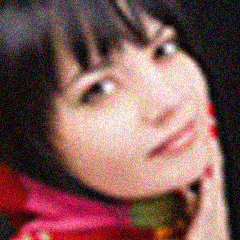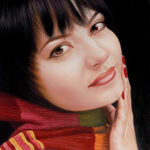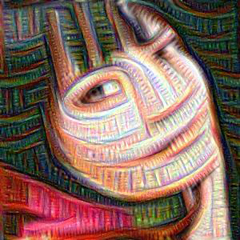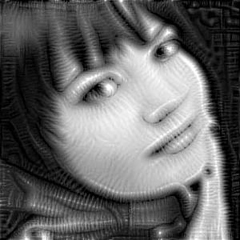| IMPROVING AND ENLARGING LOW RESOLUTION IMAGES |
 |
| One of the biggest problems faced by print technicians and their customers is the quality of the images that are being printed. It's happened to everyone: you take a photograph that is flawless and beautiful in every way - on your phone or camera's viewing screen. But when you transfer that image to the computer to do a few quick touch ups, you realize that while the subject matter may be beautiful, the image itself has a number of flaws. Or maybe it's fine as is, but when you make it larger it is suddenly very pixelated (you can see the little squares of color that make up the image).
So what do you do?
If that beloved image simply must be displayed on your wall, there are ways the print technician can minimize the pixelation, or mask it. The final result will not be a flawless, high resolution image, but it will be improved.
Check out the general overview directly below, or read on for an in-depth explanation of low resolution images and options that may improve your print.
|
SUMMARY
There are many different ways your low resolution image may be improved or disguised.
Filters and Adjustments
- Blur or Sharpen: Adding Blur will make the edges of each pixel fuzzier, eliminating the stark, straight lines around each little square. If the image is already slightly blurry, Sharpen will make the outlines of the pixels more defined.
- Add or Reduce Noise: Noise is the tiny dots, often multi-colored, that might reduce the clarity of the image (think of a "snowy" TV screen). If your original image has a lot of noise, the Reduce Noise filter can lessen this. If the image is blurry or pixelated, but does not have noise, it may be added to disguise the pixels. Sometimes noise can result in an image that looks sharper from a distance.
- Brush Strokes: Adding digital "paint" to an image can help to disguise low resolution. The image will appear softer and the brush strokes will be visible, but they may smooth out the individual pixels.
- Pop Art: Pop art involves removing any non-vital detail from an image and color blocking the remaining pieces. Think of Andy Warhol's famous Marilyn Monroe. Because the small details are no longer there, they cannot be distorted by the pixelation.
Digital Arrangements
- Collage: By arranging multiple images on a dynamic design, each image can be printed smaller (and therefore in higher resolution), but the end result is still a large wall display.
- Mosaic: Your picture can either serve as the primary image, which is formed for a collage of many other, tiny images, or it can be one of the small images (usually approximately 1"x1") used to build a different picture (perhaps a similar one of higher quality).
Non-Digital Improvement
- Handmade Oil Paintings: Have your low resolution image recreated into a beautiful original painting. The artist can work from a smaller image and create the painting at any size you choose, pixelation-free.
- Resin Coating: The smooth, high shine finish of the resin will help to mask the pixelation of the image.
- Gel Embellishment: Resulting in a heavily textured, wet-look surface, the ridges and peaks of the hardened get will minimize the appearance of the large pixels.
- Choose Canvas: Much like gel embellishment, the texture of the canvas will help to disguise some excess pixelation.
|
| WHAT DOES LOW RESOLUTION MEAN?
|
 |
|
Let's identify what we mean by "low resolution." Despite the phrase's popularity, it doesn't have a simple definition. Resolution, high or low, is not based solely on the number of pixels, the camera that took the picture, the DPI or PPI (dots, or pixels, per inch). Rather, it is a subjective term that relates to the quality of the picture when seen at a certain size. Not only does this mean different variables must be considered, it also means one person's "low res" could be another person's "just fine." In other words, "This picture is low resolution" means "This picture looks bad (blurry, pixelated, unidentifiable) at this size."
Often, a customer will describe the statistics of a photograph (DPI, or pixel count) to the technician and ask if their image is high resolution, or whether it can be printed at a certain size. Without actually seeing the photograph, this is an impossible question to answer accurately. Yes, if the image is 300x500 pixels, the technician can state with certainty that it cannot be enlarged to 24x36", but there are many factors to consider, and every photograph is different.
The most important thing to remember is this: it is almost impossible to print a high resolution image that is larger than the original size of your photograph (ie: the size you see when you go to the image's properties, listed either in inches or in pixels). The technician cannot add pixels to your image, only stretch them, which means those individual pixels you can't see in the original "high resolution" 8x10" image, are suddenly very visible at 10x12" or 16x20".
Subject matter also makes a difference. Imagine you have two photographs, both the same number of pixels, both the same DPI. One is a mountain, far off in the foggy distance, and the other is a family photograph, against a plain background. At their original size, both are in focus, with no visible pixels (essentially "high resolution"). Chances are, the former can be printed at a larger size than the latter. Why? Because a far off mountain has no small details, so slightly larger pixels will not disrupt the image too much. The faces of your family, however, will begin to be distorted as soon as you start enlarging the image.
The sections below outline some of your options for dealing with a low resolution image.
|

Low Resolution Image, 240x240 px
|
| FILTERS OR TREATMENTS |
 |
|
Photoshop, and other image editors, have a wide variety of filters, from Blur and Sharpen, to Reduce Noise. Applying these filters to your image will sometimes result in less obvious pixelation, though it will not "fix" the photograph.
There are other, more noticeable alterations that can be made in the image editor, as well. Brush stroke filters will give the image a painted appearance, while Sketch filters offer a grayscale treatment that can hide imperfections and, under the right circumstances, make your photograph look like a hand-drawn image. These options will not improve the clarity or detail, but can result in a fun, "abstracted" piece that might look better printed at a larger size.
The technician may also suggest a "Pop Art" treatment - usually for portraits - which will make your image look like it was created by Andy Warhol himself. This technique often works on low resolution images because it removes small details and darkens important features, which may make the pixelation less apparent.
Another possibility in the image editor is to purposely add pixelation or "noise" (colored dots, like a snowy TV screen) to the image. In this way, the technician is playing on the low resolution, rather than trying to disguise it. Stained glass "cells", or a patchwork pattern can also be applied. The result: a unique and modern art piece.
|

Add-noise effect
|
| COLLAGES AND MOSAICS |
 |
|
If altering the appearance of your image just isn't an option for you, a photo collage showcases your image in a smaller size, but you still come away with a large wall hanging. The technician will arrange three or more of your favorite photographs in a dynamic design that lets each picture shine as part of the larger whole. Each picture may be only 4x6", or even smaller, but the final collage can contain as many photographs as you choose.
A photo mosaic is another popular option for people with a lot of images that may be low resolution. A mosaic takes one image and rebuilds it using a collage of hundreds of other images. Your low res image could be one of these hundreds or, depending on the subject matter and quality, it could serve as the primary image created from the smaller pictures. In this way, you may be able to print your low resolution image much larger than the original.
|

Photo Mosaic Effect
 Photo Collage with multiple images Photo Collage with multiple images
|
| HANDMADE OIL PAINTINGS |
 |
|
One unique and effective way to get your low resolution photograph at the size you want is to have the image copied by hand.
The talented artist will use your supplied picture to create a beautiful oil painting that is almost identical to the photograph, but with a painterly touch. In this case, a low resolution image is acceptable, as long as important details are not obscured by the small size or large pixels. If the photo is very low quality, additional images of the same subject matter can be included to ensure the artist gets the details right. This is particularly important for portraits.
At KeenART Media, we offer beautiful, high quality handmade oil paintings at a fraction of the price you would expect to pay for such a keepsake. Our artists can have your painting completed within three weeks of your order!
|

Handmade Oil Painting
|
| RESIN AND GEL EMBELLISHMENT |
 |
|
If you would like minimal alteration done to the photograph itself, you might consider adding resin once the image has been printed.
Resin is a transparent substance that is spread over the surface of the image, and hardens as it dries, creating a thick, protective layer. The high shine of the resin helps to diminish the visibility of pixelation, and gives your print a smooth, glossy finish.
If you like the look and feel of a textured surface, a gel medium embellishment can be added to your print. The thick, transparent substance is splattered or deliberately placed over the paper or canvas and hardens in peaks and ridges, exactly as applied. The result is a "wet" look that masks large pixels within the heavy texture.
|

|
| DEEP DREAM EFFECT |
 |
|
The Deep Dream effect was created from an Artificial Intelligence program originally developed by Google. The altered image is the result of applying a filter - known as an "artificial neuron" - to an original image. The filter creates a pattern or isolates pixels depending on what is was programmed to do - anything from simply softening the image to creating a highly digital, pixelized version.
The Deep Dream effect is a great option for low resolution images. A number of the effects can completely disguise the pixelized or blurry nature of the photograph, instead creating an artistic or psychadelic interpretation.
In the first image on the right, the low resolution image shown at the top of this page has been transformed into a beautiful, cubist painting reminiscent of Van Gogh or Picasso.
In the second image, a digitized charcoal sketch of the original photograph disguises the blur with soft pencil-like strokes, for a smooth, almost organic sketch.
|

Image A

Image B
|
| THE FINAL OPTION: NO TOUCH-UPS |
 |
|
Most of the suggestions above result in a final image that is slightly (or distinctly) different from the original. If you really just want the image you have, not touched up or altered in any way, you may have to accept a smaller or lower quality print.
If you want the image to look as crisp as possible, selecting a smaller print size is the way to go. We can accept images up to a minimum of 50 DPI , but please note that the print will usually need to be smaller than that original print size. Even if your image ends up being 4x6" or 5x7", you can always select a flattering mat and picture frame, and extend the size of your display in that way.
On the other hand, if size is your primary objective, you can still have your image printed at the desired size. Just keep in mind that if the technician has warned against this size, the print will be visibly pixelated, with a loss of detail. Printing your low resolution image on canvas instead of smooth paper is another useful alteration; the heavy texture of the canvas will conceal some pixelation.
|

Smaller Print Size
|
| Digital and post-production techniques offer customers a wide selection of remedies for low resolution images. Whether you want your final image identical to the original digital picture, or you are happy with an artistic alteration, a good print technician will almost always be able to work with you to find a suitable solution.
Please do not try to fix a low resolution image on your own without first making sure the original is stored separately. We may be able to improve an original image, but it is difficult to undo previous editing. If you have any questions or concerns about an image you plan to print, please don't hesitate to contact us. We are always happy to inspect your pictures and offer suggestions.
|
|
© 2002-2025 - KeenART Media Ltd.
|
|
| |
|
